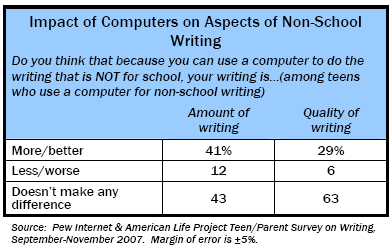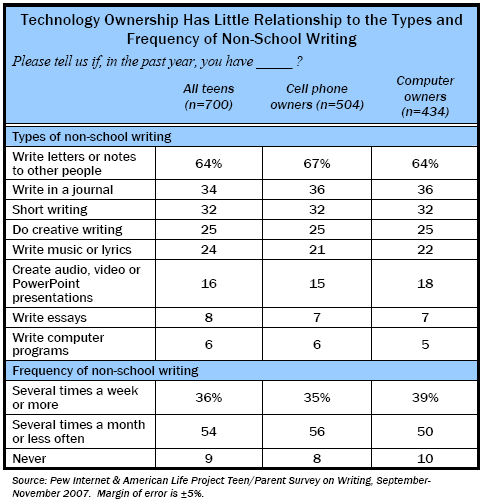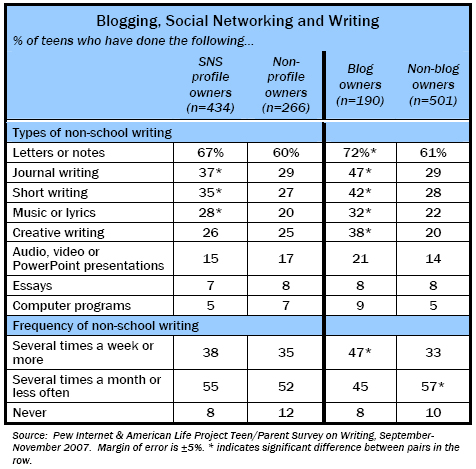Introduction
Teens write for a variety of reasons—as part of a school assignment, to stay in touch with friends, to share their artistic creations with others or simply to put their thoughts to paper (whether virtual or otherwise). In this section, we evaluate the ways in which computers and internet technologies interact with the types of writing teens do, the frequency with which they engage in writing, and their own perceptions of the quality of their writing. While assigning causality is beyond the purview of this study, we hope to place the issue of writing within the broader context of the technological immersion of today’s teens.
Teens appreciate the ability to edit and revise their writing on a computer.
For many teens, the ability easily to change, edit and revise their texts on the fly is one of the clearest advantages of writing on a computer. Nearly six in ten teens (57%) say they edit and revise more when they write using a computer compared with when they write by hand. Just over one-quarter (28%) feel that computers don’t make a difference for how much they edit and revise, and a minority (15%) actually edit and revise less when using a computer.
Whites, older teens and those whose parents have higher levels of education are among the most likely to say that computers help them edit and revise more. Fully 59% of white teens feel that they edit or revise more when writing with a computer, compared with just 40% of black teens. Black teenagers generally play down the impact of computers on the editing and revision process, with 39% saying that computers make no difference in this regard (compared with 26% of whites). Similarly, 64% of teens whose parents have some college experience say they edit and revise more when using a computer, compared with 49% of teens whose parents have a high school degree or less. Older teens are also more likely to say that they edit and revise more when writing on a computer—62% of 15-17 year olds edit and revise more when using a computer, compared with 52% of younger teens (ages 12-14).
Teens feel that computers contribute more to the quantity of their non-school writing than to its quality.
Teens who use a computer in their non-school writing feel that computers have a greater impact on the amount of writing they produce than on the overall quality of their writing. However, there is a great deal of ambiguity with respect to the impact of computers in each of these areas. Among teens who use a computer in their non-school writing, four in ten feel that computers help them do more writing, and a similar number feel that they would write the same amount whether they used a computer or not. In comparison, three in ten teens who write on a computer for non-school purposes at least occasionally feel that computers help them do better writing—and twice as many (63%) feel that computers make no difference in their writing quality. A small minority of teens feel that writing on a computer makes them write less than they would otherwise (12% feel this way) or that they write more poorly as a result (6%).

There are few major differences with respect to the impact of computers on the writing teens do outside of school. Girls tend to assign less responsibility to computers in terms of writing quality than boys—70% of girls say writing on a computer makes no difference in the quality of their writing, compared with 57% of boys.
In terms of the impact of computers on the amount of writing teens do, demographic differences center on age and parental education. Younger teens are more likely to feel that computers make them write less (18% of 12-14 year olds feel this way, compared with just 7% of older teens), while older teens are generally more likely to feel that computers have no impact on how much they write (47% believe this, versus 39% of younger teens). Parental education is also correlated with attitudes toward computers and writing. Among children of college-educated parents, 47% believe that they write more outside of school thanks to computers, compared with 34% of teens whose parents have no college experience.
Teens who personally own computers and those who do not are nearly identical in their attitudes toward the impact of computers on the quality and quantity of their writing.
Multi-channel teens are super communicators, but not super writers.
The Pew Internet Project’s recent report on Teens and Social Media18 identified a group known as multi-channel teens. These “super communicators” are defined by their usage of numerous tools—the internet, instant messaging, text messaging, cell phones and social networking sites—to communicate with friends, and they are much more likely than other teens to communicate daily across a range of media.
Although multi-channel teens communicate with friends across a range of platforms and technologies, their personal (non-school) writing habits are nearly identical to those of teens with more traditional communications habits. The only type of writing for which multi-channel teens differ significantly from other teens is in journal writing—45% of multi-channel teens keep a journal, compared with 29% for all other teens.
Multi-channel teens are also strikingly similar to other teens with respect to how much they enjoy their non-school writing, as well as the frequency with which they write for personal or non-school reasons.
Technology ownership has little relationship to the types of writing teens engage in, how frequently they write outside of school or the enjoyment they derive from their writing.
Despite concerns that computers and cell phones are encroaching on more traditional writing activities, our research indicates that simply owning these technologies has little impact on writing engagement. Teen computer and cell phone owners are nearly identical to the overall teen population in terms of the types of writing they engage in, as well as the frequency with which they write for non-school reasons.
While cell phone owning teens are more likely than non-cell phone owners to do certain types of writing in the school environment (such as essays, science labs and presentations), this is most likely due to higher rates of cell phone ownership among older teens, and not a result of technology use per se.

Bloggers do more kinds of writing, and write more frequently, than other teens.
While teens’ communication choices and use of physical technologies such as computers or cell phones are not strongly correlated with writing activities, there is a relatively strong association between writing and technology platforms that help teens share their thoughts with the world such as blogs and social networking sites.
Teen bloggers in particular engage in a wide range of writing outside of school. Bloggers are significantly more likely than non-bloggers to do short writing, journal writing, creative writing, write music or lyrics and write letters or notes to their friends. In this sense, bloggers are even more prolific than social networking teens when it comes to the types of writing they do. Social networking teens are unusual in their relative proclivity to write short writing, journal writing and music or lyrics.
Teen bloggers also write more frequently than social networking teens. Among all teens who do writing outside of school, 36% do so several times a week or more frequently. While social networking teens write for personal reasons at a similar frequency, fully 47% of teen bloggers write for personal reasons several times a week or more. Nearly one-quarter of teen bloggers (23%) write outside of school just about every day.

In addition to doing more types of writing and writing more frequently, teen bloggers are also among the strongest teen proponents of the importance of writing. Fully 65% of teen bloggers feel that writing is “essential” to later success in life, compared with 53% for non-bloggers and 56% for teens as a whole.




